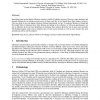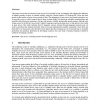125
click to vote
BMCBI
2010
15 years 2 months ago
2010
Background: Biological data have traditionally been stored and made publicly available through a variety of on-line databases, whereas biological knowledge has traditionally been ...
118
click to vote
ISIWI
2004
15 years 3 months ago
2004
The increase in the number of scientific disciplines, the continuing significant rise in the production of literature and the journal crisis at libraries has led the actors to see...
144
click to vote
ELPUB
2008
ACM
15 years 3 months ago
2008
ACM
The High-Energy Physics (HEP) community spearheaded Open Access with over half a century of dissemination of pre-prints, culminating in the arXiv system. It is now proposing an Op...
160
click to vote
ELPUB
2007
ACM
15 years 6 months ago
2007
ACM
For national advisory services in the UK (UKOLN, CETIS, and OSS Watch), varieties of openness (open source software, open standards, and open access to research publications and d...
ELPUB
2007
ACM
15 years 6 months ago
2007
ACM
This paper reports on the results of a feasibility study on open access publishing for humanities and social sciences journals supported by the Social Sciences and Humanities Rese...
112
click to vote
ELPUB
2007
ACM
15 years 6 months ago
2007
ACM
In Greece, there seems to be a growing level of awareness regarding open access among scholars, faculty staff and information professionals. Indeed, consensus regarding the necess...
ELPUB
2007
ACM
15 years 6 months ago
2007
ACM
Open Access was first defined by the Budapest Open Access Initiative following a meeting organized by the Open Society Institute/Soros foundations. The subsequent Open Access move...
131
click to vote
ELPUB
2007
ACM
15 years 6 months ago
2007
ACM
Specialized open access digital collections contain a wealth of valuable resources. However, major academic and research libraries do not always provide access to them, and thus d...
157
click to vote
ELPUB
2007
ACM
15 years 6 months ago
2007
ACM
This paper reviews the movement of open access (OA) journals in Iran, investigates and compares the influence of Iranian journals in terms of citation ranking, using the Citation ...
137
click to vote
SP
2000
IEEE
15 years 6 months ago
2000
IEEE
This position paper addresses some of the benefits and drawbacks for security of open access to source code. After a discussion of alternative models for open access to source cod...


